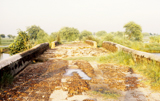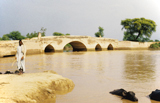 |
|
 |
   |
 |
|
|
By following one transect across the city of Lahore, the imperial
corridor from Sheikhupura to Shalamar, we gained a perspective
on Mughal garden design and the manifold questions it raises.
The roads
beyond Lahore can broaden that perspective, and indicate how other
garden centers were shaped by and influenced Lahore (see also
Lahore and Its Garden Suburbs).
In addition to the gardens below, we trace two main roads beyond
Lahore: The Grand Trunk
Road from Lahore to Peshawar, and second the The
Ancient Southern Road from Lahore to Multan. |
|
| |
|
| |
|
• Sites in Southern Lahore
For example, our exploration of the
gardens in and around Lahore has not yet taken us south along
the road toward Multan, past the gardens of Anarkali (1615), Chauburji
(1646), and Zebunnisa (mid–seventeenth century). All
of these suburban gardens are subject to enormous development
pressures and competing archaeological interpretations that call
out for further research and conservation. Further south,
the road follows the Ravi River, past the ancient Indus Valley
settlements of Harappa, to the medieval urban center of Multan.
|
|
|
|
| |
|
| |
|
|
|
|
|
• Sites in Eastern Lahore
Nor have we yet traveled down what is known today as the Mall Road,
the principal commercial strip in Lahore, which introduces us to
the magnificent gardens of the Mughal governor Wazir Khan and the
vast Mughal brickworks which the British converted into horticultural
gardens, public parks, and roundabout gardens in the nineteenth
century. Nor have we followed the diverse side roads to the east
of Lahore, such as Ghore Shah Road, named after a Sufi saint who
loved horses and whose grave receives hundreds of clay horses each
Thursday evening to this day. Early nineteenth-century maps depict
this road as lined with private residential gardens. |
|
| |
|
| |
|
Mughal
Bridge on the Old Grand Trunk Road |
 |
|
|
|
|
|
• Sites to the Northwest
Finally, traveling west from Shahdara and the Hiran Minar, the old
alignment of the Grand Trunk Road crosses ruined masonry bridges
of the Mughal era, passes through small towns that featured their
own small yet often elegant garden complexes, and leads to the famous
Wah Garden near the Buddhist center of Taxila. Beyond Wah, the road
heads to the cities of Peshawar and ultimately
Kabul, which had important Mughal gardens. |
|
|
|
Mughal
Bridge on the Old Grand Trunk Road |
 |
|
|
|
| |
|
| The
following Web pages follow two of these roads, first The
Grand Trunk Road from Lahore to Peshawar, and second
the The Ancient Southern
Road from Lahore to Multan. |
|
|
|
|
|
|
|
 |
|
|